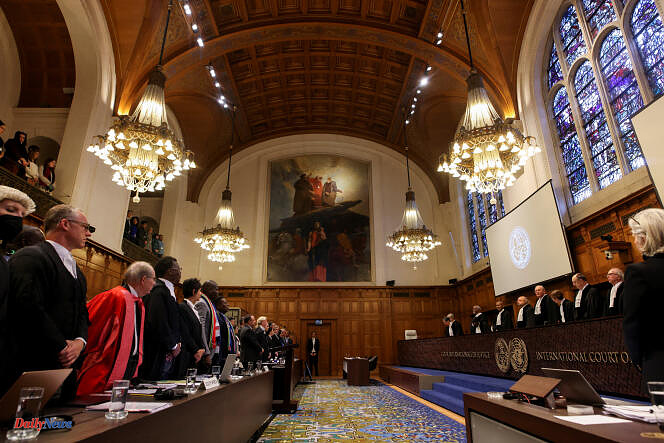The International Court of Justice (ICJ) examined, on Thursday January 11 and Friday January 12, the complaint for genocide filed by South Africa against Israel. Pretoria had seized, on December 29, 2023, the highest judicial body of the United Nations, affirming that the military operations in Gaza in retaliation for the attack of October 7 “are of a genocidal character, because they are accompanied by the specific intention required to destroy the Palestinians in Gaza.” “Totally distorted” accusations, and “a deliberately organized, decontextualized and manipulative description of the reality of current hostilities,” Israel defended Friday before the ICJ.
In its request, South Africa also urgently seized the ICJ to order it to take “precautionary measures” in order to suspend as quickly as possible the Israeli bombings in the Palestinian enclave, which have caused at least 23,000 deaths in three months, according to the Hamas-run health ministry.
But how powerful is the International Court of Justice? And what is its specificity in relation to the International Criminal Court?
Established in The Hague (Netherlands), the International Court of Justice is the principal judicial organ of the United Nations (UN). It was established following the Second World War, in June 1945, and met for the first time on April 18, 1946. Its mission is to respond to one of the primary goals of the UN: to settle disputes between States by peaceful means, while ensuring respect for the principles of justice and international law.
The ICJ is made up of fifteen judges, elected for a nine-year term by the General Assembly and the United Nations Security Council. They are called upon to rule on disputes around various questions of sovereignty, environment, air incidents, maritime navigation, genocide, etc.
Throughout its history, the ICJ has ruled on French nuclear tests in the Pacific in 1974, the hostage-taking at the American embassy in Tehran in 1980, or accusations of genocide in the former Yugoslavia in 1996. More recently, in 2023, it examined a dispute surrounding the geographical delimitation of the continental shelf located between Nicaragua and Colombia.
The scope of action of the International Court of Justice distinguishes it from other international jurisdictions. It cannot be entered by an individual, nor by an NGO, but only by the States themselves. It is not competent to judge individuals accused of war crimes or crimes against humanity. The judicial body is also not a criminal court, and does not appoint a prosecutor to initiate proceedings.
In this it differs from the International Criminal Court (ICC), also based in The Hague, and undoubtedly more publicized. Created in 1998 at the instigation of the UN, from which it is nevertheless independent, the ICC has been investigating, prosecuting and trying people accused of the most serious crimes affecting the international community since 2002: genocide, crimes against humanity, crimes of aggression and war crimes. Governed by the Rome Statute ratified by 123 countries, the ICC can only prosecute individuals, not states.
There are two types of proceedings before the International Court of Justice:
In 2003, during the second Intifada, the General Assembly requested the ICJ to find out the legal consequences of the construction of a wall by Israel in the occupied Palestinian territories. In the opinion issued a year later, the judges considered that this decision was contrary to international law and that Israel must stop this construction. But he continued building the wall, ignoring this advice. And this is not an exception: several decisions are not executed, even if, in territorial or border disputes, States still more readily apply the judgments of the ICJ.
The Court does not have any enforcement powers to enforce them. “In international law, coercive means are difficult because States are sovereign and cannot tolerate constraints imposed on them,” explains Pierre Bodeau Livinec, director of the Center for International Law (Cedin) at the University of Paris. -Nanterre.
The lawyer, however, wishes to recall “the importance of legal qualification”: “In the context of the South African request, even if this procedure will drag on over time, we imagine that it is essential for Israel to know whether it is qualified as a state which has committed genocide or not. » And added that the decisions of the ICJ, because they are authoritative in international law, can influence diplomatic negotiations.
In its application filed on December 29 before the International Court of Justice, the South African government details at length the reasons which lead it to make allegations of genocide against Israel. He invokes failures by the Jewish State "in its obligation to prevent genocide, as well as its obligation to punish direct and public incitement to commit genocide", which appear in the Convention for the Prevention and Punishment of Genocide. crime of genocide that Israel, like South Africa, has ratified.
This Convention, adopted on December 9, 1948 in Paris, obliges the 152 countries at the time, which adhered to it, to prevent and condemn any act of genocide, as the UN recalls: "The Convention obliges the States Parties to take measures to prevent and punish the crime of genocide, in particular by adopting legislation on the subject and punishing those guilty. »
It is on this basis that Pretoria is relying on its request to the judges to publicly declare that Israel is in violation of the obligations linked to this Convention. But this decision will not be expected for several months, or even several years. On the other hand, the emergency measures requested, in particular that of stopping Israeli military operations in Gaza as quickly as possible, could lead to a decision from the ICJ within two to three weeks.












